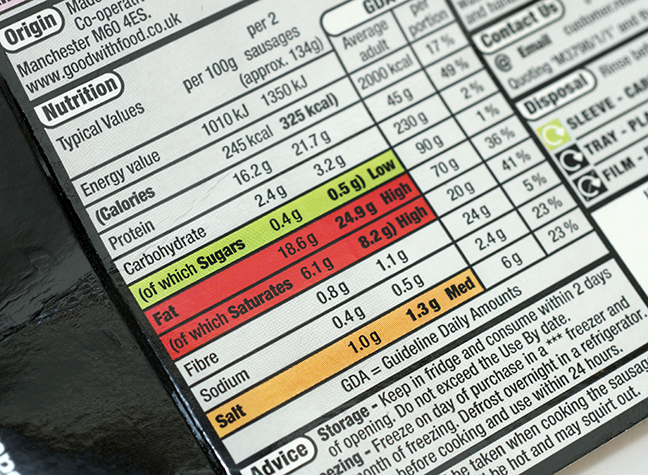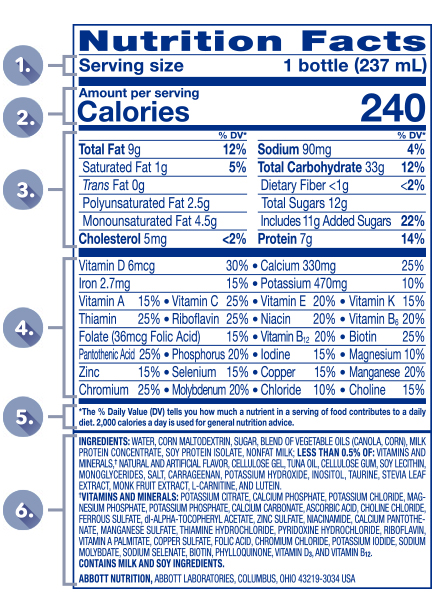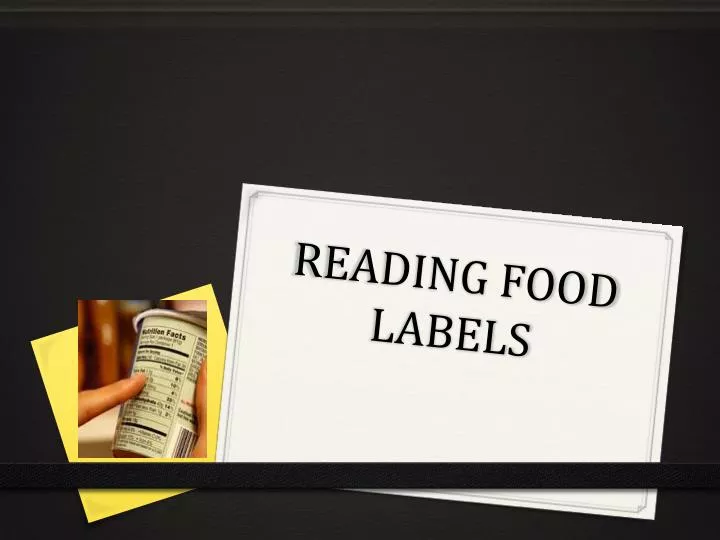40 daily values on food labels
What Is the Difference Between DRI & Daily Value? - SF Gate This number, called the daily value or DV, is based on the amount of each nutrient needed for a 2,000-calorie-a-day diet. You won't find the daily value on the nutrition facts label. Instead, it's used to calculate the information you will find on the label: the percent daily value. Daily Values (DVs) - National Institutes of Health Recommended intakes of nutrients vary by age and sex and are known as Recommended Dietary Allowances (RDAs) and Adequate Intakes (AIs). However, one value for each nutrient, known as the Daily Value (DV), is selected for the labels of dietary supplements and foods. A DV is often, but not always, similar to one's RDA or AI for that nutrient.
Percent Daily Value On Food Label - LabelCal These percentages are based on a daily diet of 2,000 calories, which is the recommended intake for an average adult. Percent daily values are required for most of the nutrients on your nutrition facts label, but not all of them. Here are the nutrients that must be accompanied by a percent daily value. Total Fat. Saturated Fat. Cholesterol. Sodium.

Daily values on food labels
Make Food Labels Work for You - caloriecontrol.org The % Daily Values on the food label are based on a 2,000 calorie diet. This is the amount of total calories per day that an adult, moderately active 132-pound female would need to maintain her healthy weight. A female who weighs less than 132 pounds, or who does not exercise regularly, would actually gain weight if she consumed 2,000 calories ... The Effects of Nutrition Knowledge on Food Label Use: A Review of the ... Nutrition labels typically contain information on calories, serving size, and amounts and/or daily values of several macronutrients, vitamins, and minerals (e.g., fats, carbohydrate, calcium). In the US, the content of NFPs is government regulated and must include serving size, calories, nutrients, and percent of daily values of each nutrient. Daily Value and Percent Daily Value: Changes on the New Nutrition and ... Facts Labels Daily Value vs. % Daily Value First, let's look at how Daily Value (DV) and Percent Daily Value (%DV) work together. ... a serving of food contributes to a daily diet. 2,000 calories
Daily values on food labels. The Basics of the Nutrition Facts Label A food item with a 5% DV of fat provides 5% of the total fat that a person who needs 2,000 calories a day should eat. You may need more or less than 2,000 calories per day. This means that you may need more or less than 100% DV that is listed on the package for some nutrients. Low is 5% or less. What Does "% Daily Value" Mean on a Food or Supplement Label? Generally, the Daily Values chosen for nutrient labels are based on a 2,000-calorie diet for healthy adults — except for when they aren't. Sometimes — particularly when it comes to critical nutrients — they reflect the needs of a population sub-group that requires more. For example, the RDA for iron is 8 mg for men and 18 mg for women. Your Guide to the New Food Label | National Kidney Foundation Food labels have percent daily values listed for a set group of nutrients based on the Food and Drug Administration (FDA) recommended 2000 calorie diet. You may need more or fewer calories, so check with your kidney dietitian. Using the daily percent values and ingredients listed, you'll be able to choose foods within your special diet needs. ... the % daily values found on a food label are based on User: the % daily values found on a food label are based on Weegy: The % daily values found on a food label are based on a 2,000-calorie diet. |Score 1|Wallet.ro|Points 251941| User: A consequence of "yo-yo" dieting is that Weegy: A consequence of "yo-yo" dieting is that the body will actually store more fat around the waist. Score 1 User: Positive energy balance is important when
FDA Rounding Rules for Your Food Label - LabelCalc If your product has: Fewer than 5 calories per serving, round down to zero. 50 or fewer calories per serving, round to the nearest 5 increment (i.e. 42 rounds to 40). More than 50 calories per serving, round to the nearest 10 increment (i.e. 106 becomes 110). Calories from Fat, Total Fat, Saturated Fat, and Trans Fat. Interactive Nutrition Facts Label - Food and Drug Administration Instead, the %DV is the percentage of the Daily Value for each nutrient in a serving of the food. The Daily Values are reference amounts (in grams, milligrams, or micrograms) of nutrients to consume or not to exceed each day. Some nutrients on the Nutrition Facts label do not have a %DV, so use the number of grams to compare and choose products. What's New with the Nutrition Facts Label | FDA Daily Values for nutrients have been updated, which may make the percent Daily Value higher or lower on the new Nutrition Facts label. As a general guide: 5% DV or less of a nutrient per serving ... How you can Calculate % of Daily Value on Food Labels How to Calculate % of Daily Value on Food Labels. Step 1. Find the nutrient amount on the food label. Step 2. Look up the total daily recommended amount in the USDA Dietary Guidelines. Step 3. Divide the nutrient amount by the total daily recommended value. Step 4.
Nutrition Labelling - Table of Daily Values - Canada.ca Food intended for children one year of age or older but less than four years of age or for children four years of age or older and adults. 1. Fat. 44 g. 75 g. 2. Sum of saturated fatty acids and trans fatty acids. 10 g. 20 g. Table of Daily Values - Canada.ca This document is a two-part table that sets out the recommended amounts of nutrients (the daily value) for specific age groups. These are the reference points upon which the % daily value in the nutrition facts table are based. Part 1 of the table sets out the daily values for macronutrients and sodium for two age groups. Food Labels | CDC If you eat the whole thing, you are eating 8 times the amount of calories, carbs, fat, etc., shown on the label. Total Carbohydrate shows you types of carbs in the food, including sugar and fiber. Choose foods with more fiber, vitamins, and minerals. Choose foods with lower calories, saturated fat, sodium, and added sugars. Avoid trans fat. Food labels - NHS These labels provide information on the number of grams of fat, saturated fat, sugars and salt, and the amount of energy (in kJ and kcal) in a serving or portion of the food. But be aware that the manufacturer's idea of a portion may be different from yours. Some front-of-pack nutrition labels also provide information about reference intakes.
How to Understand and Use the Nutrition Facts Label | FDA The Daily Values are reference amounts (expressed in grams, milligrams, or micrograms) of nutrients to consume or not to exceed each day. The %DV shows how much a nutrient in a serving of a food...

UNDERSTANDING FOOD LABELS - MAKE THE BEST FOOD DECISIONS #fatlossdiet | Reading food labels ...
How To Read Food and Beverage Labels | National Institute on Aging The percent Daily Value (% DV) tells how much a nutrient in a serving of the food or beverage contributes to a total daily 2,000-calorie diet. Although the average person needs 2,000 calories a day to maintain their weight, individuals may need more or fewer depending on their lifestyle.
Daily Value on the New Nutrition and Supplement Facts Labels New Daily Values (1) Indicates a unit of measure change. The unit of measure is how a vitamin or mineral is measured, so the %DV may look different. (2) The Daily Value decrease for folate/folic...
How To Calculate Percent Daily Value for Food Portions The Percent Daily Value is calculated by dividing the amount in a serving by the total recommended daily amount. Multiply that answer by 100, and you've got your %DV! For example: 3g in a serving. 15g recommended per day. 3/15 = 0.2. 0.2 x 100 = 20%.
Daily Value: Definition and How to Calculate It - Insider Found on the nutrition label, the daily value system tells you can help you determine if a product is high or low in particular nutrients. What does daily value mean? Daily value (DV) refers to how much of a nutrient you should consume each day based on a 2,000 calorie diet. You can find daily values for a range of nutrients on the FDA's website.
The % daily values found on a food label are based on A. a 2,000 ... The % daily values found on a food label are based on A. a 2,000-calorie diet. B. the time of year. C. whether the person is a man or woman. D. whether the food is all-natural or processed. New answers Rating 10 Wallet.ro The % daily values found on a food label are based on a 2,000-calorie diet. Log in for more information.
The Lows and Highs of Percent Daily Value on the Label The percent Daily Value (%DV) shows how much a nutrient in a serving of food contributes to a total daily diet. The %DV can help you determine if a serving of food is high or low in a nutrient. The...
How to Calculate % of Daily Value on Food Labels | livestrong Step 1 Find the nutrient amount on the food label. Step 2 Look up the total daily recommended amount in the USDA Dietary Guidelines. Step 3 Divide the nutrient amount by the total daily recommended value. Step 4 Multiply by 100. Things You'll Need United States Department of Agriculture (USDA) Dietary Guidelines Food label Calculator Tip
Percent daily value - Canada.ca dividing the amount of a nutrient in a serving size by its daily value, then multiplying that number by 100 For example, a food product has 3 mg of iron. The daily value for iron is 14 mg. This means that the % DV for iron would be 21%. If you would like to do your own calculation, use the equation below to help you. (3 mg ÷ 14 mg) × 100 = 21% DV
The Value of Daily Values - Real Food Blends Daily Reference Values (DRVs): these are established for fat, saturated fat, cholesterol, carbohydrates, protein, dietary fiber, sodium, and potassium RDIs typically represent the recommended nutrients of the group with the highest need. For example, the RDI for vitamin D is 20 mcg, which is the RDA for adults over the age of 70.
The % daily values information on a food label is based on a diet of ... User: The % daily values information on a food label is based on a diet of ___ calories. Weegy: The % daily values found on a food label are based on a 2,000-calorie diet. Score 1. User: Low fat used on a food label means there are fewer than ____ grams of fat per serving. Weegy: Low fat used on a food label means there are fewer than 3 grams ...
Daily Value and Percent Daily Value: Changes on the New Nutrition and ... Facts Labels Daily Value vs. % Daily Value First, let's look at how Daily Value (DV) and Percent Daily Value (%DV) work together. ... a serving of food contributes to a daily diet. 2,000 calories
ESHA Incorporates New FDA Nutrition Facts Labels Into Genesis R&D Food Formulation & Labeling ...
The Effects of Nutrition Knowledge on Food Label Use: A Review of the ... Nutrition labels typically contain information on calories, serving size, and amounts and/or daily values of several macronutrients, vitamins, and minerals (e.g., fats, carbohydrate, calcium). In the US, the content of NFPs is government regulated and must include serving size, calories, nutrients, and percent of daily values of each nutrient.

Learn About Food Labels For Healthy Food Choices | The National intended for Healthy Food Labels ...
Make Food Labels Work for You - caloriecontrol.org The % Daily Values on the food label are based on a 2,000 calorie diet. This is the amount of total calories per day that an adult, moderately active 132-pound female would need to maintain her healthy weight. A female who weighs less than 132 pounds, or who does not exercise regularly, would actually gain weight if she consumed 2,000 calories ...









Post a Comment for "40 daily values on food labels"